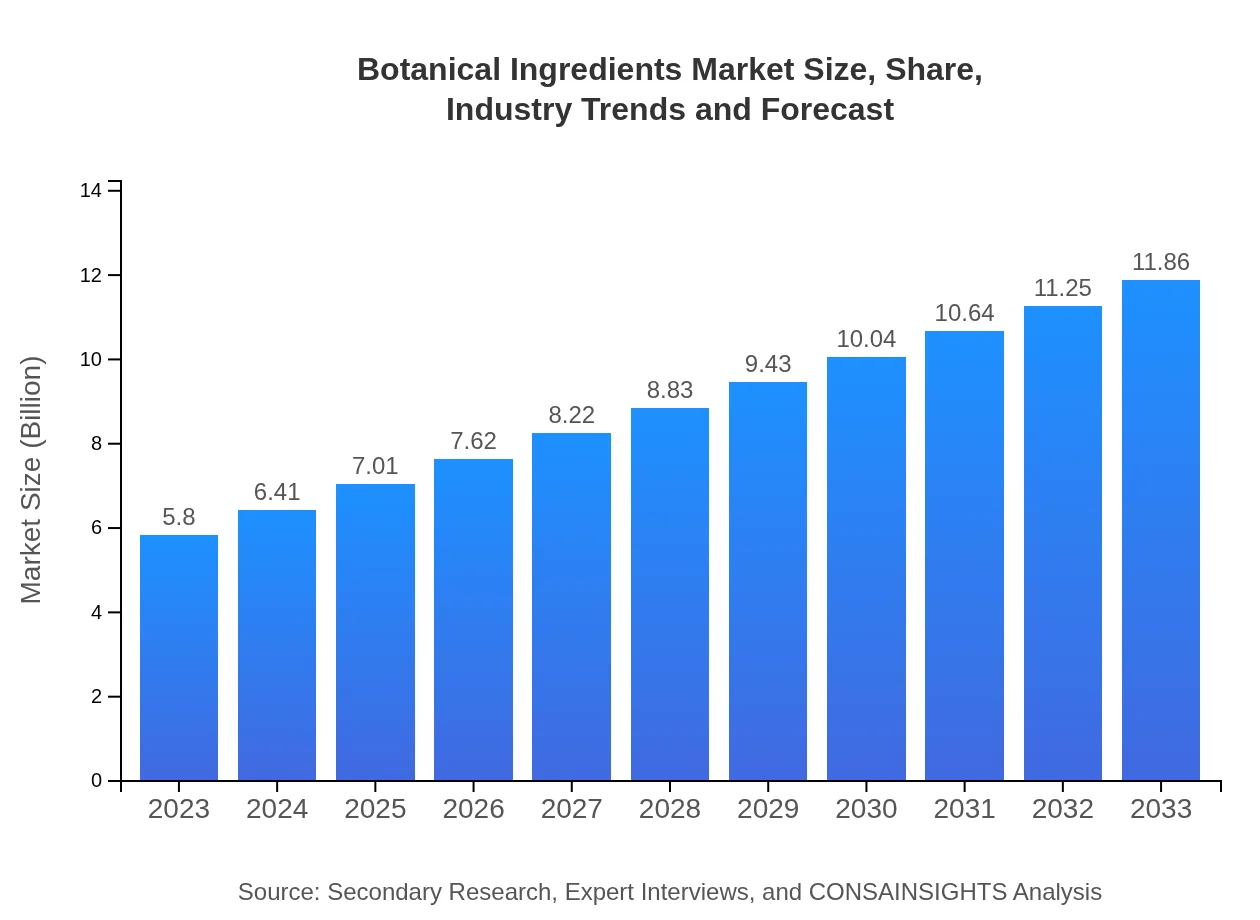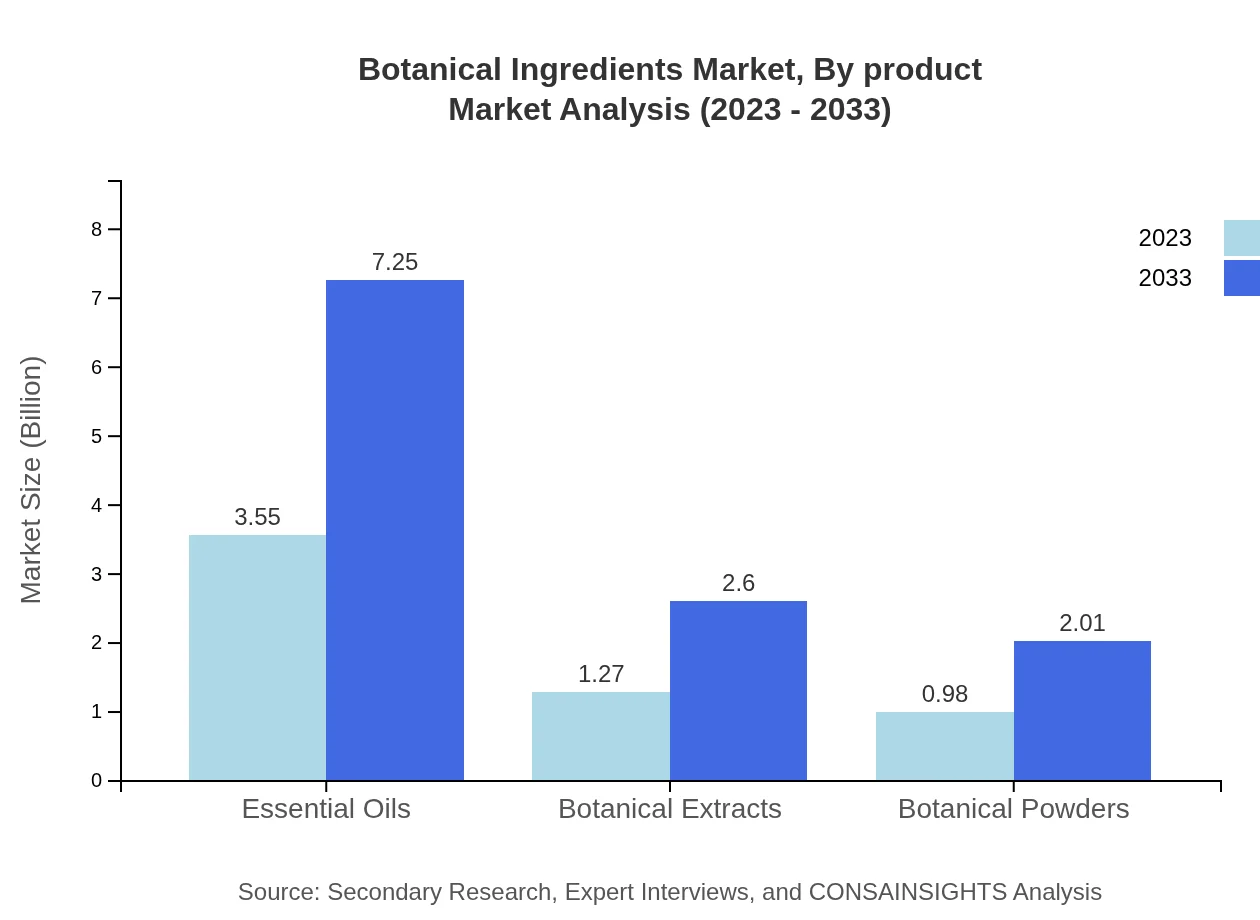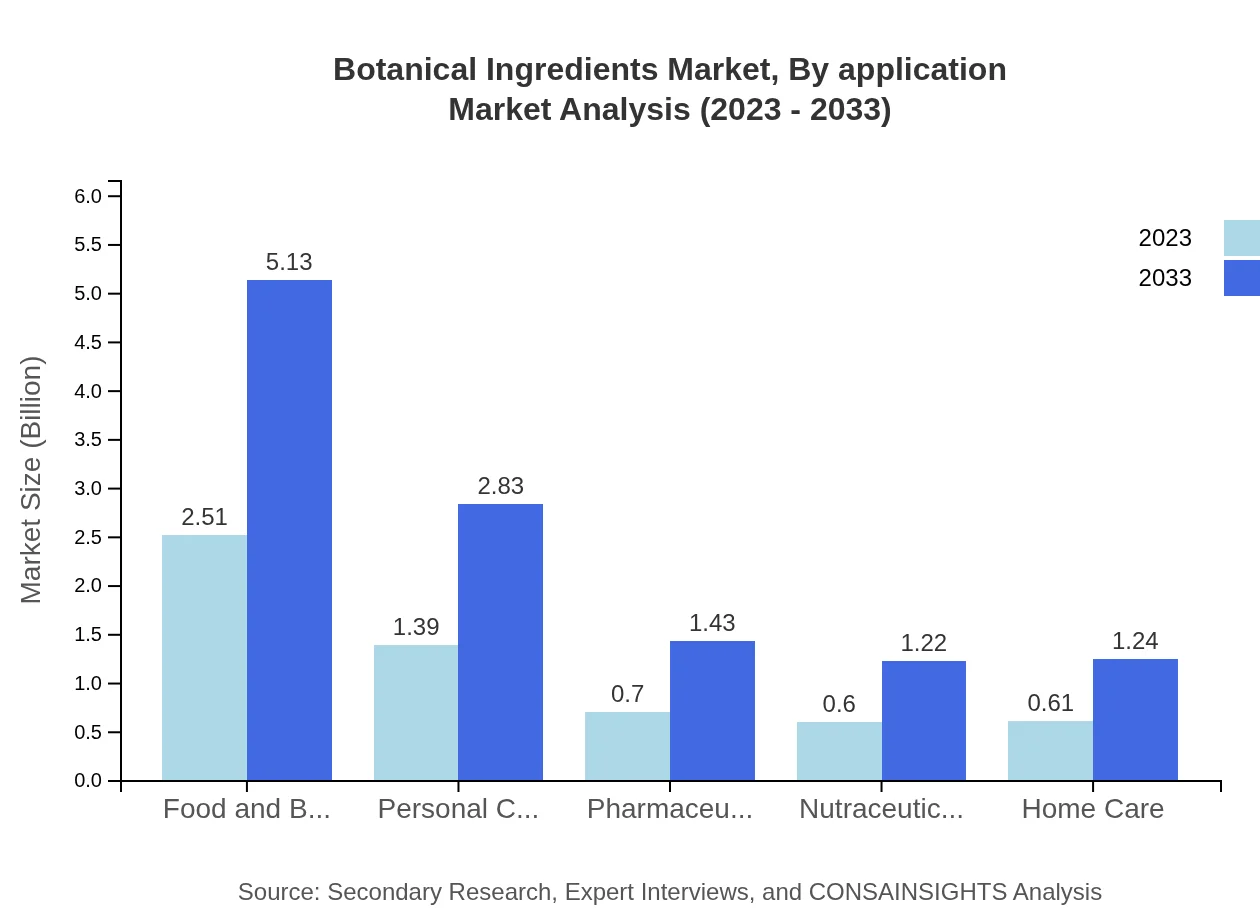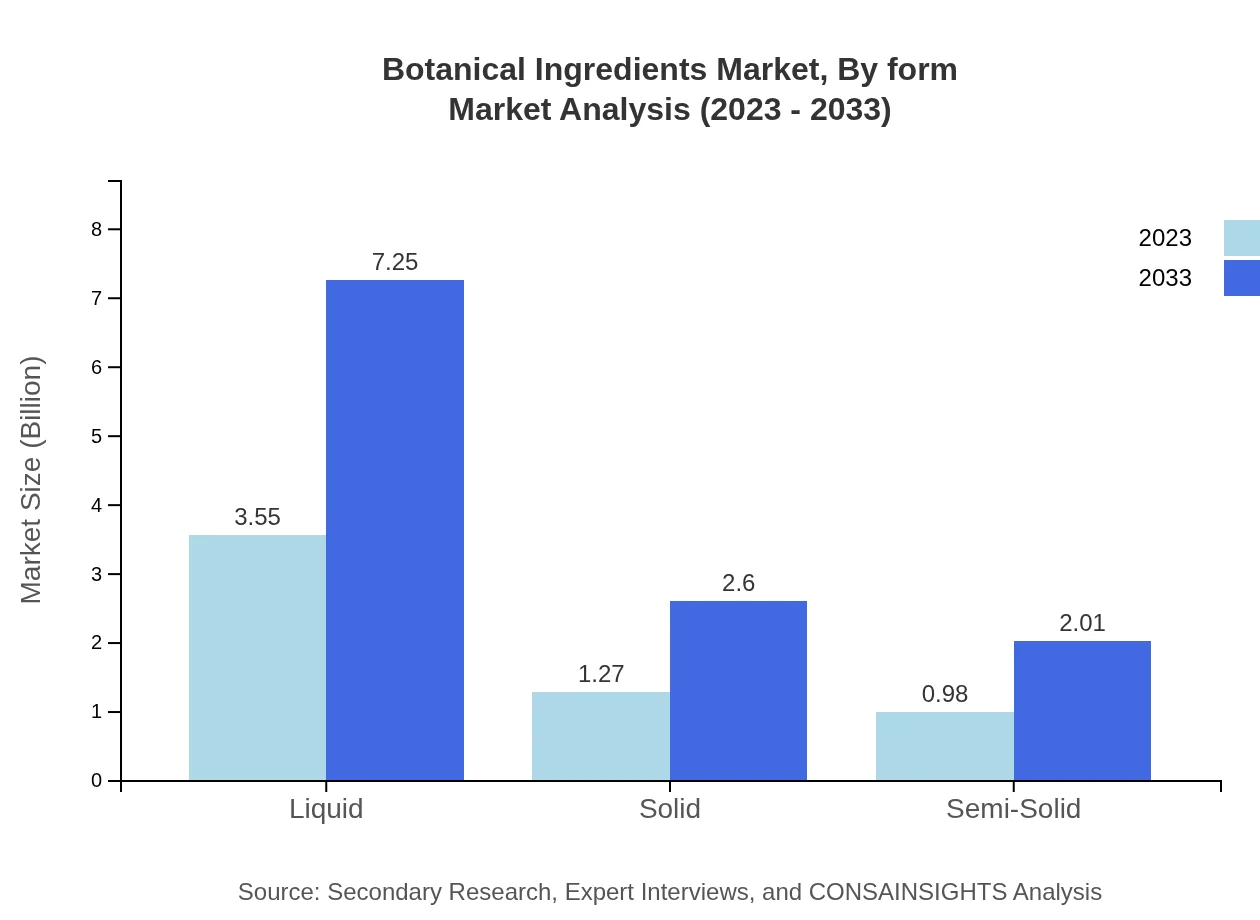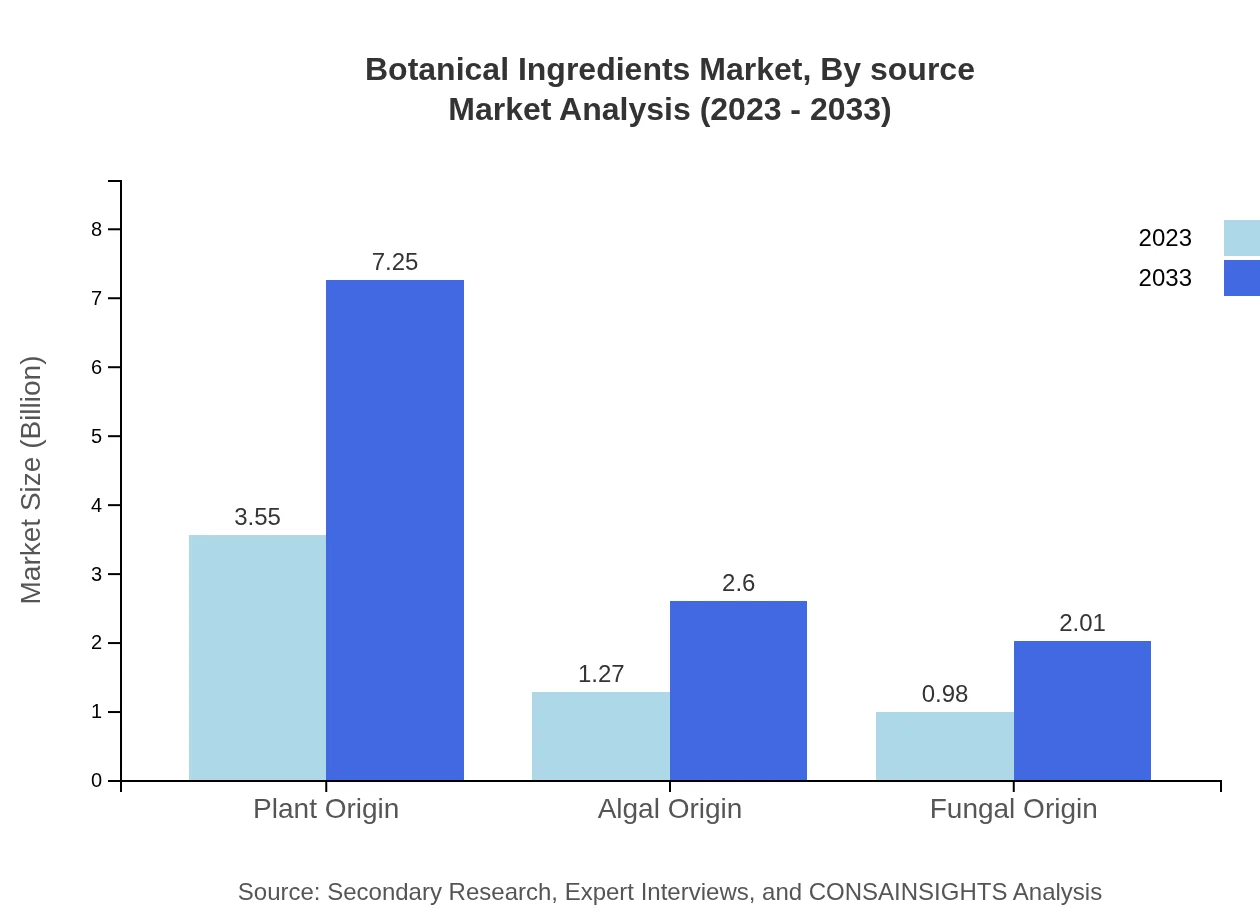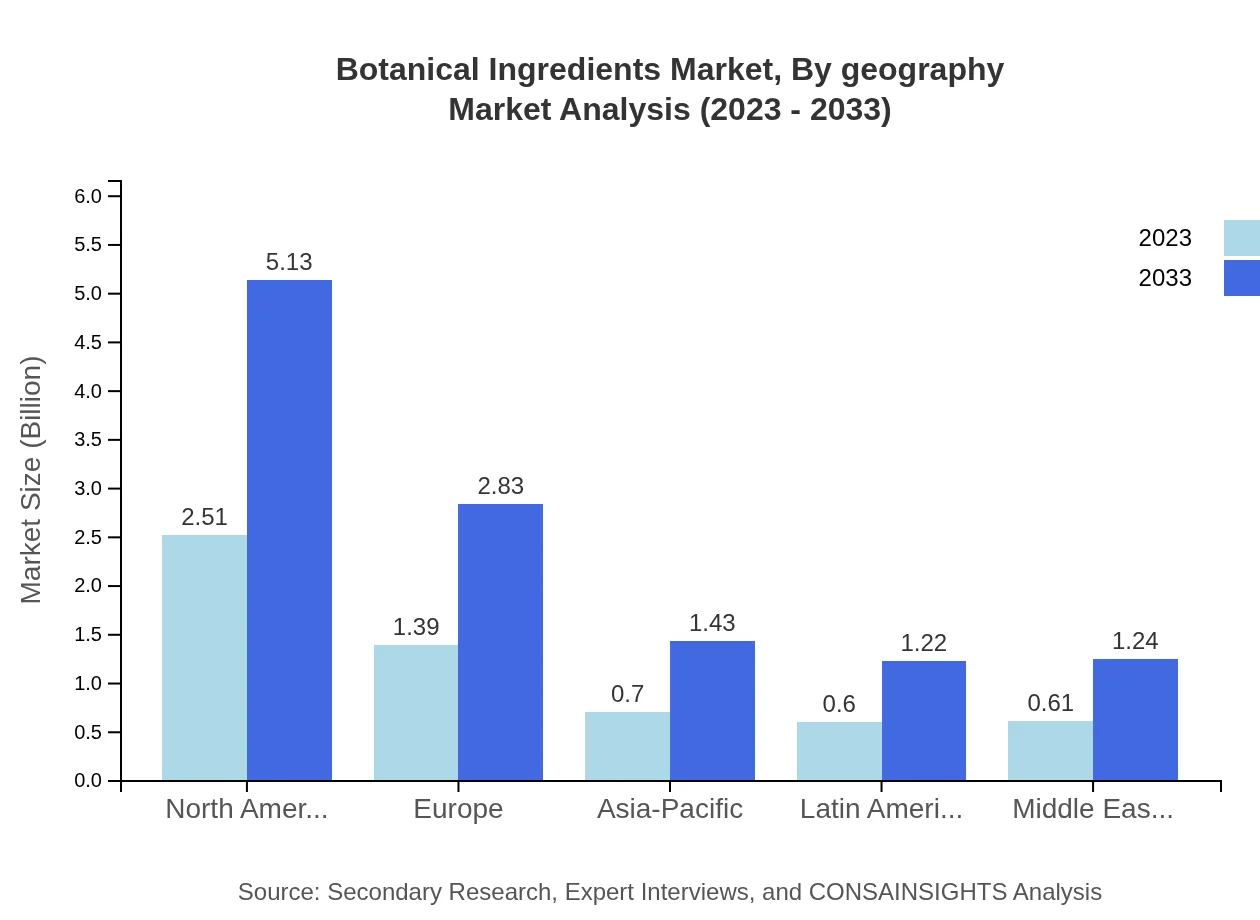Botanical Ingredients Market Report
Published Date: 31 January 2026 | Report Code: botanical-ingredients
Botanical Ingredients Market Size, Share, Industry Trends and Forecast to 2033
This report provides an in-depth analysis of the Botanical Ingredients market, examining growth prospects, trend forecasts, and competitive dynamics from 2023 to 2033, supported by quantitative data and qualitative insights.
| Metric | Value |
|---|---|
| Study Period | 2023 - 2033 |
| 2023 Market Size | $5.80 Billion |
| CAGR (2023-2033) | 7.2% |
| 2033 Market Size | $11.86 Billion |
| Top Companies | Givaudan, DowDuPont, Kemin Industries |
| Last Modified Date | 31 January 2026 |
Botanical Ingredients Market Overview
Customize Botanical Ingredients Market Report market research report
- ✔ Get in-depth analysis of Botanical Ingredients market size, growth, and forecasts.
- ✔ Understand Botanical Ingredients's regional dynamics and industry-specific trends.
- ✔ Identify potential applications, end-user demand, and growth segments in Botanical Ingredients
What is the Market Size & CAGR of Botanical Ingredients market in 2033?
Botanical Ingredients Industry Analysis
Botanical Ingredients Market Segmentation and Scope
Tell us your focus area and get a customized research report.
Botanical Ingredients Market Analysis Report by Region
Europe Botanical Ingredients Market Report:
Europe is another crucial market for Botanical Ingredients, starting at a size of $1.85 billion in 2023 and projected to reach $3.77 billion by 2033. The rise in consumer preference for clean label products, driven by health concerns and environmental sustainability, underlines the market's growth. EU regulations on food additives and stringent quality standard practices also foster a competitive landscape for botanical products.Asia Pacific Botanical Ingredients Market Report:
The Asia Pacific region is a significant contributor to the Botanical Ingredients market, with a current market size estimated at $1.01 billion in 2023 and expected to reach approximately $2.07 billion by 2033. This growth is driven by the increasing demand for herbal products and traditional medicines, coupled with a rise in health consciousness among consumers. Countries like India and China are leading in botanical cultivation, catering not only to domestic but also global markets.North America Botanical Ingredients Market Report:
The North American market is anticipated to expand significantly, with a market size of $2.11 billion in 2023 growing to approximately $4.32 billion by 2033. The substantial demand for organic products across food, beverages, and pharmaceuticals is primary, supported by robust regulatory frameworks encouraging natural product formulations. Key players are increasingly catering to health-oriented consumers, leading to advanced innovation.South America Botanical Ingredients Market Report:
In South America, the Botanical Ingredients market is also experiencing growth, projected to rise from $0.40 billion in 2023 to around $0.82 billion by 2033. The region is rich in biodiversity, providing a plethora of ingredients that appeal particularly in the cosmetics and nutraceutical sectors. Sustainable harvesting and ethical sourcing are becoming focal points as local communities engage in the market.Middle East & Africa Botanical Ingredients Market Report:
In the Middle East and Africa, the market is comparatively smaller, at $0.43 billion in 2023 and forecasted to grow to $0.87 billion by 2033. The increasing awareness of the benefits of botanical ingredients, along with a growing beauty and wellness industry, is expected to bolster demand. Many local companies are focusing on traditional and indigenous ingredients, appealing to cultural heritage markets.Tell us your focus area and get a customized research report.
Botanical Ingredients Market Analysis By Product
The Botanical Ingredients market is primarily categorized by product type, which includes Essential Oils, Botanical Extracts, and Botanical Powders. In 2023, essential oils lead the market with a size of $3.55 billion, holding 61.17% market share, and is projected to grow to $7.25 billion by 2033. Botanical extracts follow with a size of $1.27 billion in 2023, expected to rise to $2.60 billion sharing 21.89% of the market. Botanical powders contribute a size of $0.98 billion, with growth expectations to $2.01 billion over the same period.
Botanical Ingredients Market Analysis By Application
Applications of Botanical Ingredients span across various sectors, predominantly in food & beverages, personal care, pharmaceuticals, nutraceuticals, and home care. The food and beverages sector shows a leading market size of $2.51 billion in 2023 and expects to reach $5.13 billion by 2033. The personal care sector follows at $1.39 billion, anticipated to grow to $2.83 billion, underscoring the vital role of botanical ingredients in enhancing product formulations.
Botanical Ingredients Market Analysis By Form
By form, the Botanical Ingredients market consists of Liquid, Semi-Solid, and Solid categories. Liquids dominate the market, with a size of $3.55 billion in 2023 and a share of 61.17%. This segment is projected to grow to $7.25 billion by 2033. Semi-Solid products show a size of $0.98 billion with expectations of reaching $2.01 billion, while solid forms represent a significant portion with an anticipated growth from $1.27 billion to $2.60 billion.
Botanical Ingredients Market Analysis By Source
The sources of botanical ingredients include plant origin, algal origin, and fungal origin. Plant-based ingredients dominate, projecting a size increase from $3.55 billion in 2023 to $7.25 billion by 2033, while algal origins are growing from $1.27 billion to $2.60 billion and fungal origins from $0.98 billion to $2.01 billion, indicating rising interests in alternative sources of bioactive compounds.
Botanical Ingredients Market Analysis By Geography
The geographical analysis reveals diverse growth patterns across regions, with North America and Europe leading in terms of market size. North America had a size of $2.51 billion in 2023 and is expected to grow to $5.13 billion by 2033, while Europe starts at $1.39 billion and aims for $2.83 billion. Meanwhile, regions like Asia Pacific and South America are notably catching up, enhancing their market shares through local sourcing and international partnerships.
Botanical Ingredients Market Trends and Future Forecast
Tell us your focus area and get a customized research report.
Global Market Leaders and Top Companies in Botanical Ingredients Industry
Givaudan:
A leading flavor and fragrance company, Givaudan focuses on the extraction and development of botanical ingredients for food and beauty industries, ensuring sustainable practices.DowDuPont:
DowDuPont plays a significant role in the manufacturing of bio-based materials and chemicals, integrating botanical extracts into various applications, particularly in personal care.Kemin Industries:
Kemin is known for its innovative botanical extracts used in food preservation, pharmaceuticals, and pet food formulations, dedicated to sustainable sourcing.We're grateful to work with incredible clients.









FAQs
What is the market size of botanical Ingredients?
The global botanical ingredients market is valued at approximately $5.8 billion in 2023, with a projected CAGR of 7.2%. By 2033, the market is expected to exhibit substantial growth, reflecting a robust demand.
What are the key market players or companies in this botanical Ingredients industry?
Key players in the botanical ingredients industry include market leaders in natural products, pharmaceuticals, personal care, and nutraceutical sectors. These companies leverage botanical sourcing to create innovative products that meet consumer demands for natural ingredients.
What are the primary factors driving the growth in the botanical ingredients industry?
The growth in the botanical ingredients industry is primarily driven by increasing consumer demand for natural, organic products, rising health consciousness, and expanding applications in food and beverages, personal care, and pharmaceuticals.
Which region is the fastest Growing in the botanical ingredients?
Currently, Europe stands out as the fastest-growing region in the botanical ingredients market, projected to grow from $1.85 billion in 2023 to $3.77 billion by 2033, showcasing remarkable growth driven by consumer preferences.
Does ConsaInsights provide customized market report data for the botanical ingredients industry?
Yes, ConsaInsights offers customized market report data tailored to specific needs within the botanical ingredients industry, allowing clients to access relevant insights based on their business requirements and objectives.
What deliverables can I expect from this botanical ingredients market research project?
Deliverables from the botanical ingredients market research project typically include detailed market analysis, growth forecasts, competitive landscape, opportunity assessments, and customized data insights to support strategic decision-making.
What are the market trends of botanical ingredients?
Current trends in the botanical ingredients market include a shift towards sustainability, increasing use of botanical extracts in personal care and healthcare products, and a growing inclination towards plant-based formulations among consumers.

